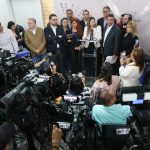The perception of public corruption in Nicaragua occupies one of the highest levels in Latin America and the world according to the analysis of Luciana Torchiarothe main adviser for Latin America and the Caribbean of Transparency International (TI), who warns that there is a “consolidated dictatorship” in the country.
TI published this week the Corruption Perceptions Index 2022 which assigns a score between zero (highly corrupt) and one hundred (very transparent) to the countries evaluated, in addition to placing them on a scale among 180 nations that shows the perceived levels of the phenomenon in the public sector.
According to the international report, Nicaragua is ranked 167 out of 180 countries and registered 19 points, which places it on a par with countries such as Venezuela (14) and Haiti (17), the worst cases in the region that are frequently cited in reports. international organizations with serious institutional problems.
“Nicaragua suffers from extremely entrenched, systemic corruption problems. Corruption is rooted in the political system,” said Argentine political scientist Torchiaro in a telephone interview with CONFIDENTIAL, held this Wednesday, February 1, from Berlin, Germany.
Torchiaro has been working at the IT Secretariat for a decade, from where he has been able to follow up on the issue. Above all, he is very clear about the causes of the drop in the Nicaraguan Index, which dropped 10 points in 2022, compared to the numbers of a decade ago when it obtained 29 points.
The expert explains that up to there they can compare, because before there was another methodology in the measurement.
The reasons for the stagnation in Nicaragua
“(The situation in Nicaragua) It has a lot to do with the consolidation of the Ortega-Murillo dictatorship in recent years, the excessive concentration of power in those figures, the total reduction of the independence of State institutions and, obviously, the reduction of civic space to dramatic levels allows us to explain the tragic situation in terms of corruption that Nicaragua is experiencing”, stated Torchiaro.
The expert stated that the Nicaraguan case develops when in the Central American region there is also a tendency to attack democracy as occurs in El Salvador or Guatemala. In the latter country, the dismantling of the Public Ministry has resulted in the institution now persecuting prosecutors, judges, and journalists who systematically denounced corruption.
The measurement reflects that the rest of the Central American countries were evaluated in this way: Honduras (23), Guatemala (24), El Salvador (33), Panama (36) and Costa Rica (54).
“In Nicaragua we have a consolidated dictatorship. However, in the rest of the countries we are seeing very worrying trends that also threaten democracy, such as the concentration of power in the figure of President (Nayib) Bukele in the case of El Salvador,” added the specialist.
In regimes like Nicaragua and Venezuela, where there is a concentration of power and extreme levels of opacity, according to his words, this reality prevents transparency and accountability. In addition, justice is at the service of executives and is used to persecute opponents, the independent press and impede freedom of association.
Torchiaro also said that in Nicaragua there is no possibility of counterbalancing power, that is, of denouncing. If those who do it go to jail, for her “there is no way to control corruption. On the contrary, this allows everything to flow and crimes to go unpunished.”
Ortega and Murillo lead “kleptocratic” regime
The political scientist Manuel Orozcodirector of the Migration, Remittances and Development Program of the Inter-American Dialogue, opined that corruption reaches an extreme, when it is systemic and articulated by a specific group, as occurs in Nicaragua.

Orozco added that the International Monetary Fund (IMF) uses the term “State capture” in reference to the way in which a group uses state institutions for the benefit of the group, and it goes to the extreme when it is kleptocratic. “Both occur in Nicaragua,” he warned.
“None of this is new, and it is one of the factors that has characterized the Ortega-Murillo dynasty, inherently clientelistic in nature, is to make use of economic and political favors from the regime to exchange support and loyalty to them,” Orozco maintained.
For the specialist, the tentacles of the family system extend into key sectors such as services and food, and not only in control of the energy industry. They form and consolidate a managerial estate within the State that assigns the types of favors.
“The level of corruption is so high that when members of the circle of power take advantage of the discretion they are given through favors, they enrich themselves and spread corruption. The recent purges are the result of the institutional rot that occurs as a result of the excesses of authority used by friends of the family to the regime. The purges are not due to dissidence, they are due to excesses, because ‘they stole without the permission of the lady or the commander,’” she commented.
The publication of the TI study provoked mixed reactions. The independent body Urnas Abiertas (UA) once again moved on its social networks an editorial published in October 2022, in which they precisely point out that corruption has been intrinsically linked to the political history of the country since its founding. That is, the Central American states that were founded after independence from Spain showed their tendency to be corrupt and politically unstable.
Open Polls: “FSLN is a corporatist organization”
The AU denounced then that the pro-government Sandinista National Liberation Front (FSLN) had become a “corporatist organization” in which its members exchange benefits and their cohesion is not maintained by any ideology, but by political and economic transactions and a high degree of impunity.
In fact, the political scientist Manuel Orozco considers that the break between businessmen and Ortega occurred in 2018, when the Superior Council for Private Enterprise (COSEP) did not resolve their own expansion as an economic class.
“The resistance of COSEP that reaches its final point before the official announcement of the change in pensions for retirees to continue with this relationship, breaks with the pact. But the family continues with their businesses, taking advantage of the customs administration, the tax operation, the economic policy, and in the midst of the crisis they continue to benefit,” Orozco asserted.
For a sociologist, consulted on condition of anonymity, what allows a closed system of corruption to be established where there are no institutions that monitor transparency is precisely the discretion of the regime. In the case of the Ortega-Murillo family, one cannot speak of ideologies, but rather of a family clan that uses resources to control its own and those whom it may consider critical.
The sociologist said that, regardless of the ideology of the populists, they focus on managing investments that project their image and the problems begin when the resources to manage the corrupt scheme begin to lack.
“Populist governments have not risen by coups d’état, or military as in the past. They have gone up through the polls. They take over through democratic mechanisms and inside they begin to erode democracy”, argued this social scientist.
For decades, in the absence of effective oversight institutions in the State, the independent media have documented—first in the country and from 2021 in exile—the corruption scandals of the Ortega regime, using sources inside the institutions of the State that have guided journalists in the midst of the context of repression.
From the traditional State-Family-Party corruption scheme—a repetition of the one developed during the Somocism—the Ortega dictatorship has also been denounced for the enrichment of its ruling class and directly of the leadership headed by the presidential family.
In February 2022, CONFIDENTIAL published an investigation into the Ortega-Murillo business network that revealed that they had a network of 22 companies, made up of 18 executives and 5 lawyers as front men. They got benefits for Venezuelan cooperation and they benefited from the same State that awarded contracts to some of these companies.
The spider web created for the promise of the interoceanic canal, the biggest infrastructure failure of the current administration, was also subject to scrutiny by the independent press. The same happened with Venezuelan cooperation, which meant 5 billion dollars between 2007 and 2016, and which was privatized. However, a new social class emerged, linked to Ortegaism, and grew in this country with human rights violations, corruption and impunity.

















